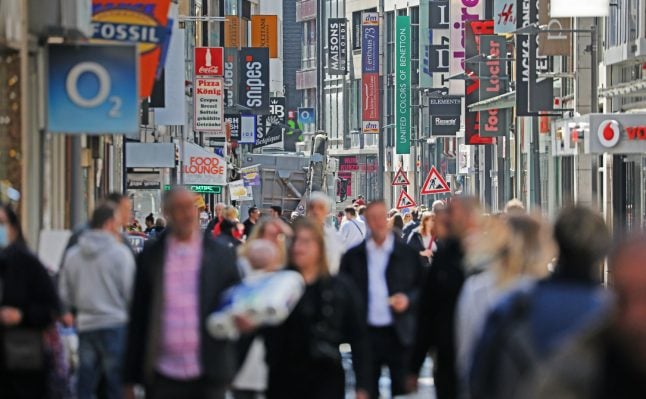The survey conducted by the Bertelsmann Foundation and the research institute Infas found the population's cohesion has increased significantly in recent months.
While 46 percent of people in February still considered cohesion in this country to be at risk, this proportion fell to 36 percent in May and June, according to the study.
At the same time, more Germans feel people have been looking out for each other – that is despite the distance rules and contact bans which were put in place to stem the spread of coronavirus.
Whereas in February 41 percent said that citizens did not care about others, this figure had fallen to only 19 percent by early summer. Trust in the federal government also increased: from 19 to 45 percent; while satisfaction with democracy rose from about 50 to 60 percent.
The results are based on surveys that were conducted in two waves in February and March as well as May and June as part of the long-term study called “Radar Social Cohesion”.
The study has been showing how social cohesion is perceived since 2012. In comparison with the most recent study in 2017, cohesion in Germany is stable. “Even though many citizens are worried about social cohesion, it remains robust overall,” said study author Kai Unzicker.
In the first wave, more than 3,000 people were interviewed, with the researchers differentiating between interviews before March 3rd and after, because coronavirus restrictions began to come into play then.
In May and June, 1,000 people were interviewed again. And it turned out that most of those surveyed said cohesion had improved after more than two months of the crisis.
“In a crisis situation, many have experienced real solidarity in the form of neighbourhood help with shopping or childcare,” said study author Unzicker.
READ ALSO: Germany sees highest number of confirmed coronavirus cases since May
Some groups feel less cohesion
But this narrative doesn't apply to everyone. While the pandemic left hardly anyone untouched, there are groups who are more concerned and feel less social cohesion. These include poorer and less well educated people, single parents and people with a migration background.
“Someone who is well educated and has a high income has the opportunity to do home office (work from home),” said Unzicker. “People with less education and on a lower income, on the other hand, are more likely to be put on reduced working hours (Kurzarbeit) and lose their jobs, and this is where fears rise.”
READ ALSO: Why some single mums feel invisible in Germany's coronavirus crisis
Unsurprisingly, those who already knew a high level of cohesion before the crisis felt less lonely in recent months – and had fewer worries about their own future or that of their family.
According to Unzicker, politicians should therefore pay more attention to particularly affected groups. Those who feel little cohesion and do not have stable social infrastructure should be the focus.
“It is about more support in the districts in order to be able to react locally to the adversities of life for these people,” he said.
If, for example, the situation with childcare or schools does not improve significantly in the foreseeable future, the researchers believe those who are disadvantaged will suffer further.
READ ALSO: Is Germany heading for a second lockdown amid rise in coronavirus cases?
People less worried about economic decline
Surprisingly the fear of economic decline has also fallen compared to the initial phase of the pandemic in Germany, the study found.
While in February more than half of those surveyed were still worried about being or becoming poorer themselves, this figure had fallen to 47 percent by early summer.
Fear of unemployment has also decreased significantly, from 44 percent to 31 percent. People in Germany are also slightly less worried about an economic and financial crisis (63 instead of 68 percent).
Unzicker also said this change of mood reflects the fact that coronavirus restrictions have been eased, and there's some relief that Germany has got through the crisis.
The question is: can this positive outlook remain in view of the rising number of infections?
Vocabulary
Cohesion – (der) Zusammenhalt
Citizens – (die) Bürgerinnen und Bürger (male and female, or with the gender star: Bürger*innen
Crisis situation – (die) Krisensituation
Compared to – im Vergleich zu
We're aiming to help our readers improve their German by translating vocabulary from some of our news stories. Did you find this article useful? Let us know.



 Please whitelist us to continue reading.
Please whitelist us to continue reading.
Social distancing has pulled Germans closer together. Ummmm
It is true at the beginning behaviour of people was different and with passage of time it changed. Now feelings for others have improved a lot and people got the feeling that in difficult times it is good to face the difficulties being united and together.